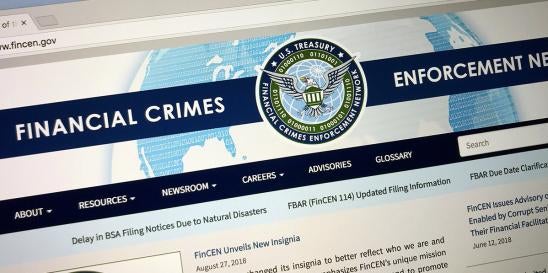On February 16, 2024, the Financial Crimes Enforcement Network (“FinCEN”) issued a proposed rule addressing “Anti-Money Laundering Regulations for Residential Real Estate Transfers.” The proposed rule would, among other things, require certain persons involved in real estate closings to maintain records regarding non-financed residential real estate transfers and to submit “streamlined SARs” (suspicious activity reports), called Real Estate Reports, to FinCEN. “The persons subject to these reporting and recordkeeping requirements would be deemed reporting persons for purposes of the proposed rule and . . . [t]he information required to be reported in the Real Estate Report would identify the reporting person, the legal entity or trust to which the residential real property is transferred, the beneficial owners of that transferee entity or transferee trust, the person that transfers the residential real property, and the property being transferred, along with certain transactional information about the transfer.”
As FinCEN describes in the Federal Register notice including the proposed rule, the Bank Secrecy Act has generally required that real estate transaction information falls within the categories of transactions that are subject to appropriate money laundering controls since 1970. However, “for many years, FinCEN has exempted such persons from comprehensive regulation under the BSA and has issued a series of time-limited and geographically focused ‘geographic targeting orders’ (“GTOs”) to the real estate sector in lieu of more comprehensive regulation.” In particular, in 2016, FinCEN specifically extended a Residential Real Estate GTO to “require title insurance companies to file reports and maintain records concerning non-financed purchases of residential real estate above a certain price threshold by certain legal entities in select metropolitan areas.” As a result of that 2016 GTO, the information received has indicated to FinCEN that more comprehensive regulation is necessary, when it comes to non-financed real estate transactions. The goal of this permanent rule would be to “connect non-financed residential real property purchases by certain legal entities with the true beneficial owners making the purchases, thereby decreasing the ability of criminals to hide their identities while laundering money through real estate.”
Effectively, the proposed rule would require that at least one person involved in the real estate transaction would have to submit the Real Estate Report. And, that one person would not need to exercise any discretion regarding whether to file the Real Estate Report (unlike when traditional SARs are filed) and the proposed rule would not require confidentiality to be maintained by any of the persons involved in the filing of the Real Estate Report (again, unlike the confidentiality covered institutions must maintain regarding whether they have filed a SAR). While there is a hierarchy in terms of which person would, under the rule, be obligated to submit the Real Estate Report, the parties may also sign a “designation agreement” that would designate a particular person identified in the hierarchy as being the reporting person. Primarily, that person should be “the person listed as the closing or settlement agent on a settlement (or closing) statement.” If there is no agent on the closing statement, then the person that has prepared the closing statement should submit the Real Estate Report. If there is no closing statement, then the person that underwrites the title policy should submit the Real Estate Report. And, if there is no title policy underwritten, then reporting should be done by the “person that disburses the greatest amount of funds in connection with residential real property transfer”, meaning disbursement from an escrow account, a trust account or from a lawyer’s trust account, but excluding direct transfers between transferees. If there is no person disbursing on behalf of the transferees, then the person who prepares an evaluation of the title should submit the Real Estate Report. And, if all else fails, then the person that prepares the deed for the transaction should submit the Real Estate Report. This so-called “reporting cascade” is designed to “capture both sales of residential real estate and non-sale transfers of residential real estate . . . to ensure uniform coverage of non-financed transfers and to ensure that nominees do not purchase homes for criminal actors and then transfer the title on free of charge to a legal entity or trust.”
There are three elements that determine whether a transaction is a “reportable transaction”:
1) Is the kind of property involved in the transaction covered by the rule?
2) Is any transferee considered a “transferee entity” or “transferee trust”?
3) Is the transaction not covered by any of the following exceptions?
- Transaction is financed;
- Transaction is low-risk because it involves an easement, death, divorce or bankruptcy; or
- Transaction involves transfer directly to an individual person.
In terms of the transactions that would be subject to being reported through the Real Estate Report, FinCEN cast an intentionally broad net. “The proposed rule is meant to broadly capture residential real property such as single-family houses, townhouses, condominiums, and cooperatives, as well as apartment buildings designed for one to four families. These properties would be captured even if there is also a commercial element to the property, such as a single-family residence that is located above a commercial enterprise.” Further, many kinds of land-only transactions would be reportable.
In terms of the types of transferees involved, as mentioned, any transfer directly to an individual, even if that transfer was not financed and was not deemed to be low-risk, would not result in a reportable transaction. But, if the transferee is any person other than an individual and that transfer is not financed or is not low-risk, then the transfer would most likely be deemed a reportable transaction. The definition of “transferee entity” generally means “any person other than a transferee trust or an individual.” The definition of “transferee trust” generally means “any legal arrangement created when a person . . . places assets under the control of a trustee for the benefit of one or more persons . . . or for a specified purpose, as well as any legal arrangement similar in structure or function[,] whether formed under the laws of the United States or a foreign jurisdiction.” There are specific exemptions to both of these transferee definitions, including statutory trusts and trusts that are securities reporting issuers, and for the most part, FinCEN points to protocols described in its rules under the Corporate Transparency Act (“CTA”), especially its Beneficial Ownership Reporting Rule, as being applicable to defining which entities and trusts may or may not be exempt from these transferee definitions. Having said that, the inclusion of most trusts involved in non-financed transactions is especially interesting.
In addition to the proposed rule provisions, FinCEN lists no less than 50 questions for comment from interested parties. These questions include everything from how likely “designation agreements” are likely to be used to concerns that may arise in transactions that are partially non-financed to whether concerns relating to non-financed real estate transactions extend to commercial real estate, as well. Comments are due to FinCEN on or before April 16, 2024.




 i
i


